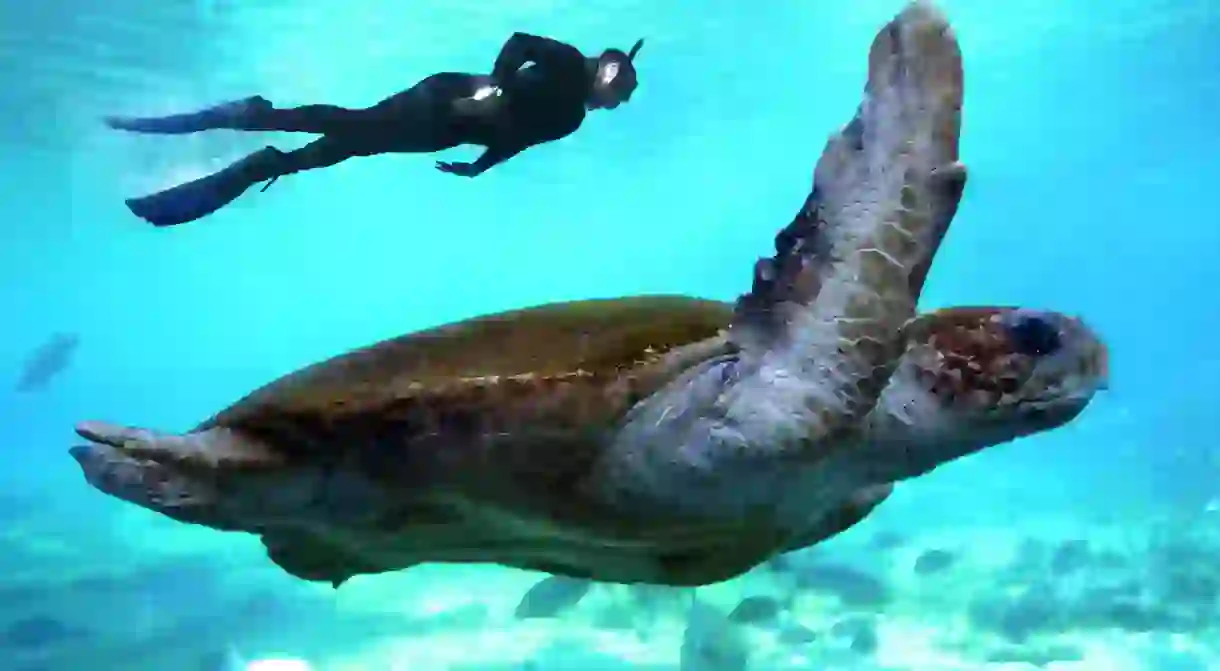The Best Places to Snorkel in Byron Bay, Australia

It’s one of Australia’s most popular holiday destinations, but only a fraction of visitors to Byron Bay discover the fantastic marine environment it has to offer. Extending for 37km (23mi) along the northern NSW coastline from the Brunswick River to Lennox Head, the Cape Byron Marine Park conserves subtropical marine habitats home to more than 1,000 marine species, making it an excellent place to strap on a snorkel.
With water temperatures and currents changing throughout the year, the marine park receives many seasonal visitors, from grey nurse sharks and whales in winter to leopard sharks and manta rays in summer. There are also two shipwrecks to explore just offshore.
Julian Rocks

The remains of a volcanic eruption more than 20 million years ago, the rocky island that sits 2.5km (1.5mi) off Cape Byron known as Julian Rocks (or Nguthungulli in the Bundjalung language of Byron Bay’s Aboriginal community) forms a unique marine habitat. While most popular with divers, the shallow depths (5-18m/16-60ft) make it a top spot for snorkelling in good visibility. Depending on the time of year, snorkelers can expect to see everything from eagle and manta rays to wobbegong, reef and leopard sharks as well as dozens of smaller fish species. Byron Bay Dive Centre and Sundive both run snorkelling trips.
The Wreck
As locals like to tell the story, the crew of the Wollongbar were getting drunk at the Beach Hotel (then the Pier Hotel) when the passenger steamship docked at Byron’s former jetty was blown aground in 1921 during a gale. But the truth is that the crew were on board, ready to board passengers for the 5pm service to Sydney when the weather got the better of the captain, and the ship ran aground. Located in shallow water just 30m (100ft) offshore, with its rudder tiller still sticking above the surface, what’s left of the Wreck continues to attract an abundance of marine life including wobbegong sharks, stingrays and turtles.
Tassie III
A 120-tonne steel ship requisitioned by the US Army, the Tassie III arrived in Byron Bay in June 1945 to anchor from a storm and sank alongside the jetty that night. The cargo of spent munitions was later blown up, but the wreckage, which lies in 3-9m (10-30ft) of water about 100m (330ft) offshore from Fishheads restaurant, attracts even more marine life than the nearby Wollongbar. Calm days tend to offer the best visibility.
Captain Cook
Sand movement in the bay often uncovers a vast, shallow rocky reef straddling the Captain Cook and Clarkes beaches. On a snorkel, you could encounter everything from octopi to sand rays, as well as plenty of fish and maybe even a reef shark. There’s another small, rocky reef just west of The Pass, while further west lie larger reefs known as Little Reef and Old Man’s Reef, but it’s not advised to swim out this far alone.
Broken Head Marine Reserve
Known as the Three Sisters, the rocky outcrops off Broken Head, a 15-minute drive south of Byron, attract similar critters to the seaside reefs of Byron Bay, with dolphin sightings common. With currents around the rocks known to be unpredictable, this snorkelling spot is best suited to strong swimmers. Further south, the Whites Beach headland can also be a good snorkelling spot when the water is calm.

Brunswick River
For something different, grab your snorkel and head 15 minutes north from Byron to Brunswick Heads. At high tide, the river can be surprisingly clear, offering snorkelers a chance to spot stingrays, flatheads, bream and potentially even a green turtle or a dolphin or two. Avoid boat traffic by sticking to the section opposite the town’s pub, which is technically known as Simpson’s Creek, being mindful of the razor-sharp oyster shells when getting in and out.
Did you know – Culture Trip now does bookable, small-group trips? Pick from authentic, immersive Epic Trips, compact and action-packed Mini Trips and sparkling, expansive Sailing Trips.













